Final Statewide Healthcare Terms and Conditions
Terms and Conditions as Required by the Arbitration Award and Resolution of Negotiations
Between the Commission of Public School Employee Health Benefits Pursuant to the
Provisions of 16 V.S.A. Chapter 61 For The Period of January 1, 2023 through December 31, 2025.
Overview and Highlights of your Healthcare Plan
On December 1, a panel of arbitrators unanimously rejected the Vermont School Boards Association’s attempt to make healthcare more expensive and less accessible to the state’s educators, especially women and those who earn the least. What’s striking is that, in the end, your team was able to beat back huge increases in out-of-pocket costs, an unfair and unreasonable scheme to hike premium costs for ESPs and other non-licensed staff, and a cynical attempt to make many non-licensed employees ineligible for healthcare coverage at all.
Like in the first round of statewide healthcare bargaining, your team of experienced and dedicated local negotiators came armed with facts, solid economic arguments, and a relentless focus on what’s really at stake: the health and well-being of the thousands of you who dedicate your lives to Vermont’s children. The difference was clear: while the VSBA touted your healthcare as a shiny “Rolls Royce” in need of “having some of the chrome removed,” your team went beyond the numbers and reminded the arbitrators that what we’re talking about is real people whose healthcare is at risk.
The current healthcare plan remains intact until December 31, 2022. As you’ll see below, the changes coming as a result of your team’s hard work are modest and, in many cases, leaves current plan provisions untouched. You can click here to see just how bad your healthcare plan would have been if the VSBA had prevailed.
In the coming weeks, we’ll let you know about opportunities to ask questions, get answers, and hear from your bargaining team. They – and a dedicated cadre of Vermont-NEA staffers – worked for nearly a year to ensure that your healthcare remains available, affordable, and comprehensive.
Duration
Effective for all covered employees from January 1, 2023 through December 31, 2025.
Eligibility
All school employees who work at least 17.5 hours a week are eligible for all tiers of coverage. Non-full-time employees will receive a prorated premium payment from school boards. This is unchanged from the current arrangement.
Employment Status
Full-time status for all public-school employees to be bargained locally. This is unchanged from the current arrangement.
Premium Contributions
For the entire duration of the new healthcare agreement, teachers and licensed employees will pay 20 percent of premiums for VEHI Gold CDHP and VEHI Silver CDHP, with school boards paying 80 percent. For employees choosing VEHI Gold or Platinum Plans, boards will pay the equivalent of 80 percent of the premium for Gold CDHP; employees will pay the remainder. This is unchanged from the current premium split.
Support staff who do not already pay 20 percent of their premiums will be subject to a 1 percentage point increase each year. This is less than the 2 percent increase that will go into effect under the current plan on January 1, 2020. If support staff are already at 20 percent when the new agreement starts on January 1, 2023, there will be no hikes in premium splits for the duration of the agreement. These are smaller increases than what current terms require for this coming year.
Pro-rata contributions for less-than-full-time employees will be determined locally. Regardless of prorated premium sharing, out-of-pocket expenses will remain the same for all tiers and all plans. This is unchanged from the current arrangement.
Tiers of Coverage
All employees will be eligible for all tiers of coverage. This is unchanged from the current arrangement.
Out-of-Pocket Expenses
The maximum a teacher or other licensed employee will have to pay toward out-of-pocket expenses will be $600 for single coverage and $1,000 for all other tiers. These amounts only apply after school boards pay $1,900 for single coverage and $4,000 for all other tiers. This is a slight increase from the current arrangement.
The maximum an ESP or other non-licensed employee will have to pay toward out-of-pocket expenses will be $300 for single coverage and $600 for all other tiers. These amounts only apply after school boards pay $2,200 for single coverage and $4,400 for all other tiers. This is unchanged from the current arrangement.
Grievance Process
A grievance can be filed by the local association or school board to the Commission on Public School Employee Health Benefits. This commission has an equal number of representatives from unions and school boards. The commission then hears the grievance; if no majority is found, the matter heads to arbitration. This is a change from the current arrangement.
Cash-in-lieu of Insurance
The provision of payments to employees who obtain health insurance from sources other than a school district will continue to be governed by the local bargaining process. This is unchanged from the current arrangement.
Side-by-Side Comparison Chart
Arbitrators Unanimously Reject VSBA Attempt to Further Make Healthcare Unaffordable
December 2, 2021
A panel of three arbitrators unanimously chose your team’s approach to statewide healthcare, dealing a blow to an attempt by the Vermont School Boards Association team to further hike out-of-pocket expenses.
The 22-page decision makes it clear that your team’s decision to accept the recommendations of a neutral factfinder was key. “Based on the totality of evidence and the arguments of the parties, the arbitration panel unanimously concludes that there is no compelling reason to reject the recommendations set forth in [the] well-reasoned fact-finding report,” the panel wrote.
The panel summed up the arguments made by each side, and the comparison is brutal. The VSBA’s team – representing employers – made the case that healthcare plans for educators are too generous. Indeed, the panel says the employers’ representatives “proposed to increase out of pocket [costs to educators] to reduce cost and utilization by increasing ‘participation’ by members.” The employer team “describes the employee health plans as a ‘Rolls Royce’ from which [their] proposal will only remove some ‘shiny chrome,’” the panel wrote.
In contrast, the panel characterized your team’s proposal in terms of what it means to actual people. Acknowledging your team’s acceptance of the fact-finding report was already a concession, the panel said, “the employees focus on the impact…on the lowest wage earners, and on big users of health care, for whom higher [out of pocket costs] will be financially onerous, and ‘may push employees over the edge.’ The employees say $10 billion in federal stimulus aid to Vermont has left if with a large surplus, yet the employer’s last best offer ‘targets the sick, poor, families and women.”
As you may recall, both teams presented a week’s worth of evidence to the arbitration panel last month. The arbitrators were asked to resolve two key issues: the amount of out-of-pocket expenses and the arbitration process. The new healthcare plan will go into effect Jan. 1, 2023 and will last three years.
Your team agreed with the fact-finder’s report, which recommends out-of-pocket costs for licensed educators to be $600 a year for single plans and $1,000 a year for all other tiers of coverage. The factfinder recommended no increase in out-of-pocket costs for non-licensed employees, which are currently $300 for single coverage and $600 for all other tiers.
By contrast, the VSBA team wanted to see those costs grow each year of the three-year package. For teachers and other licensed employees, that would amount to $800 a year for single coverage and $1,600 for all other tires in the final year. For non-licensed workers, the hike would be to $400 for single coverage and $800 for all other tiers in the final year. If the VSBA had gotten its way, licensed educators would have seen a doubling of out-of-pocket expenses at the end of the three-year package.
This arbitration decision – which you can read here – is a win for your dedicated team of statewide healthcare bargainers and for everyone of you who stood up, organized, wrote letters, and engaged with your local school boards. Over the coming weeks, we’ll be sharing more details and will give you an opportunity to ask questions of your team. Click here to read detailed updates, timelines, and comparisons between your team’s approach and the one taken by the VSBA team.
An Update on Statewide Healthcare Bargaining: It’s Not About Numbers. It’s About You.
November 10, 2021
On Friday, your statewide healthcare bargaining team finished four days of testimony and closing arguments before a panel of arbitrators. As they weigh their binding decision – due by December 5 – your team reminded them that in the end, this process is about people. You. Your families. Your colleagues and their families.
“During the last four days of hearing, numbers were discussed, spreadsheets disputed, premium share contribution levels bandied about, and out-of-pocket exposure numbers explored. Diving into this level of minutiae over the course of four days can be exhausting, confusing, and downright tedious,” Rebecca McBroom, Vermont-NEA’s legal counsel, said in her closing arguments after four grueling days of testimony. “However, this cannot and must not obscure us from the intense human impact that this overwhelmingly critical round of statewide health care negotiations will have on roughly 35,000 Vermonters. The union requests that first and foremost, you view the evidence through the lens of how your decision will affect our state as a whole: our educators, our students, our families and our communities.”
From the start of this process nearly a year ago, your team has been dogged in its determination to make these negotiations about the people who rely on good healthcare. Your team has remained committed to fighting for healthcare that is accessible, more affordable, and comprehensive. Sadly – but not unpredictably – the Vermont School Boards Association team wants to punish you, especially if you are lower-paid, especially if you are a woman, especially if you actually use healthcare. Indeed, VSBA’s lawyer, Joe McNeil, argued that their desire to hike your out-of-pocket costs is merely removing the “shiny chrome” from the “Rolls Royce” healthcare plans your already have.
“It is cold and cruel to believe that is acceptable that people who need more medical care simply must pay more for it because ‘that is just the way it is’” as a member of VSBA’s team put, McBroom argued. “Humans are at their most vulnerable when they or their family members are sick. It is the last time in their lives that people should be worried about the cost of their health care.”
In the end, only two significant areas of disagreement are up to the arbitrators to decide: out-of-pocket expenses and grievance procedures. The panel of arbitrators will choose either the VSBA’s cynical plan that seeks to stick higher healthcare costs onto the backs of thousands of pandemic heroes, or your team’s more balanced approach – an approach that is in complete agreement with the findings last month of a neutral factfinder. (You can read that report right here.) The arbitrators’ decision is binding, and will govern the statewide healthcare plan that begins on Jan. 1, 2023. The plan will be in effect for three years.
Your team agreed with the fact-finder’s report, which recommends out-of-pocket costs for licensed educators to be $600 a year for single plans and $1,000 a year for all other tiers of coverage. The factfinder recommended no increase in out-of-pocket costs for non-licensed employees, which are currently $300 for single coverage and $600 for all other tiers.
By contrast, the VSBA team wants to see those costs grow each year of the three-year package. For teachers and other licensed employees, that would amount to $800 a year for single coverage and $1,600 for all other tires in the final year. For non-licensed workers, the hike would be to $400 for single coverage and $800 for all other tiers in the final year. If the VSBA gets its way, licensed educators would see a doubling of out-of-pocket expenses at the end of the three-year package.
Instead of agreeing with the fact-finder’s out-of-pocket recommendations, the VSBA team argued that the factfinder didn’t really mean what he said and that he must have “made a mistake.” Your team adamantly rejected that argument, and McBroom urged the arbitrators to do the same.
“We are living in extraordinarily difficult and dangerous times. School employees have been profoundly impacted by the COVID pandemic, along with other essential workers,” McBroom said. Your slate of bargainers “believe that Factfinder John Cochran’s recommendations, submitted after three intensive days of hearing, recognizes the fundamental need to do the least harm, medically and financially, to school employees and their families. Mr. Cochran did not make a mistake, technical or otherwise, in his thinking about the amounts or the potential impact of these amounts. He weighed the evidence carefully, and he determined that his recommendations would be fair to both parties.”
Last Best Offers Presented; Out-of-Pocket Costs Remain Key Difference
October 26, 2021
Your team and the VSBA bargainers submitted their last best offers ahead of a scheduled arbitration hearing the week of November 1. You’ll remember that when this process started, the VSBA team made it clear that they wanted to make healthcare more expensive, less accessible, and, for our lowest-paid school employees – mostly women – simply out of reach.
Below you’ll see that your team has worked hard to prevent thousands of school employees from losing their health insurance. The VSBA team and your bargainers still disagree on the issue of out-of-pocket costs, where the VSBA team continues to try and force school employees to pay more for their healthcare, even as the pandemic rages on.
School Boards’ Healthcare Bargaining Team Continues Quest to Hike Costs for Educators
September, 2021
In their zeal to saddle Vermont’s school employees with sharply higher healthcare costs, the Vermont School Boards Association yesterday signaled they had no intention to reach a negotiated settlement for a statewide healthcare package slated to go into effect in 2023.
The VSBA team – after a day-long session aimed at finding common ground – made it clear that they do not have a problem with making healthcare even less accessible and more expensive for the thousands of public-school employees who are in the midst of yet another school year ravaged by COVID.
“In the middle of a pandemic – when our focus should be on doing what’s right for Vermont’s students – the VSBA team wants to reduce access to healthcare for thousands of our lowest paid school employees and make coverage more expensive for everyone else,” said Mike Campbell, a social studies teacher who serves as the co-chairman of the Commission on Public School Employee Health Benefits and as the chief negotiator on behalf of school employees. “After nine hours of stonewalling, the VSBA team made it clear that they had no intention of reaching a negotiated settlement. Instead, they continued their cynical disregard for the dedicated educators who have gone above and beyond for Vermont’s children.”
With their unwillingness to negotiate a settlement, the VSBA team has guaranteed that the costs of healthcare for the thousands of Vermonters working in our public schools will be decided by binding arbitration. That was the same path the VSBA took during the first round of statewide healthcare bargaining in 2019.
Yesterday’s bargaining session came after a neutral factfinder issued a report that acknowledges saddling school employees – especially the lowest paid workers – with significant increases in healthcare expenses is wrong. For example, the VSBA’s plan to hike premium costs for support staff – custodians, bus drivers, paraeducators, cafeteria workers – “could significantly erode an employee’s annual wage,” according to John Cochran, the neutral factfinder. He added that a similar proposal by the VSBA team to significantly hike out-of-pocket costs on the lowest-paid school employees would be similarly troublesome.
“I do not believe this is the appropriate time to shift out-of-pocket costs to employees by the large amounts they are proposing,” Cochran wrote in recommending no change in out-of-pocket costs for support staff. He recommended only modest increases in out-of-pocket costs for teachers and other licensed school employees, and fully shot down the VSBA team’s attempt to saddle public school employees with higher premium rates than those paid by state employees or employees of the University of Vermont or state college systems. Cochran’s full report can be read below.
Throughout this round of bargaining, the team representing school employees has sought to make healthcare more accessible and affordable for all, especially the lowest-paid workers. By contrast, the VSBA team has remained steadfast in its desire to make healthcare even more out of reach for educators.
“It’s truly shameful that the VSBA team is steadfast in its push to extract economic pain from those who work with Vermont’s children,” Campbell said. “Educators have been there throughout this pandemic, working harder than ever. It’s beyond our understanding that the VSBA team wants to saddle these dedicated Vermonters with higher healthcare costs.”
Now that the VSBA team has rejected all attempts at a settlement, both sides will submit their final proposals. An arbitration team will hear testimony from both sides before November 15 and will choose one of the proposals by December 15. That binding decision will go into effect on January 1, 2023.
Fact-finding position comparison
The VSBA's position would force public school employees to shoulder even more of the burden
of rising health care costs - we should all be working to make health more affordable, not less.
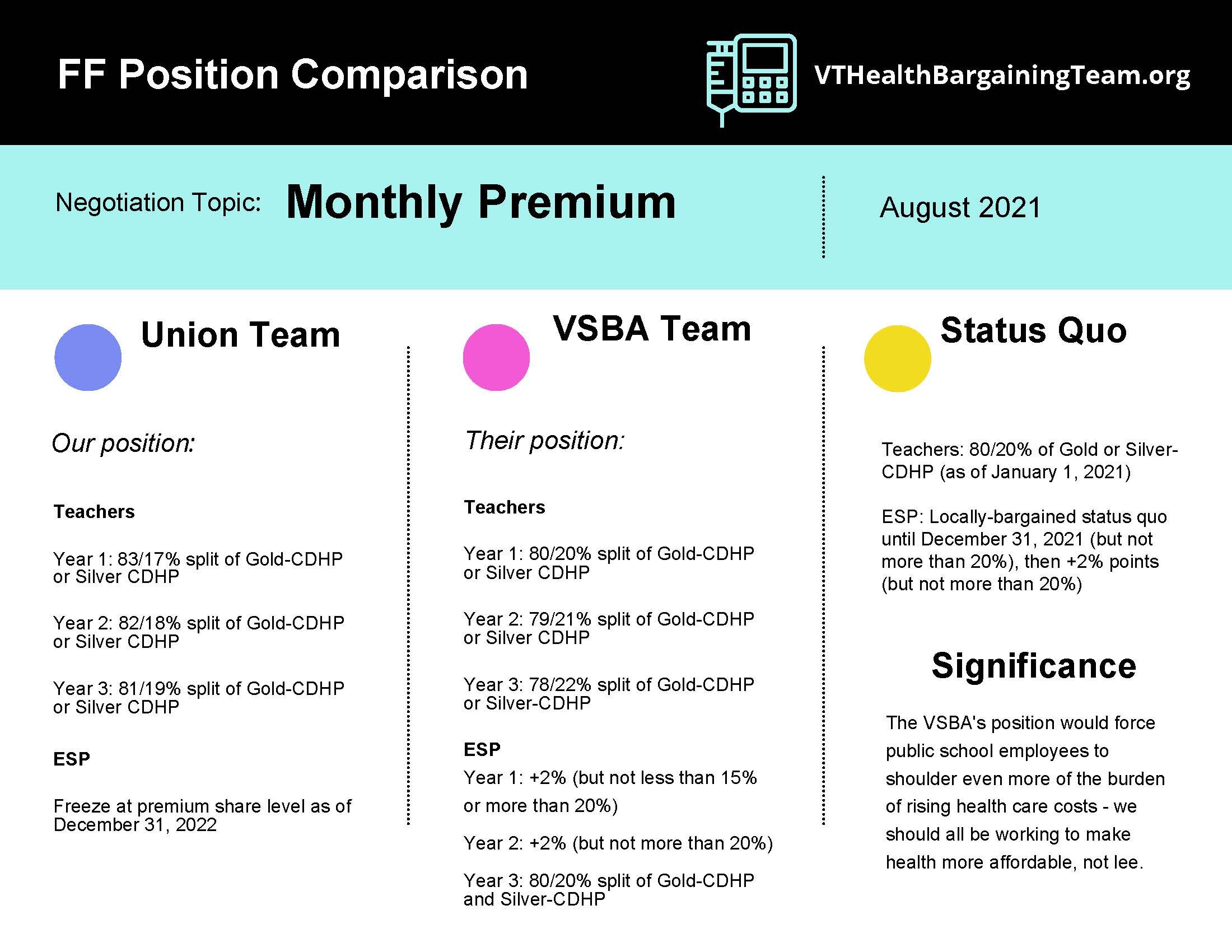
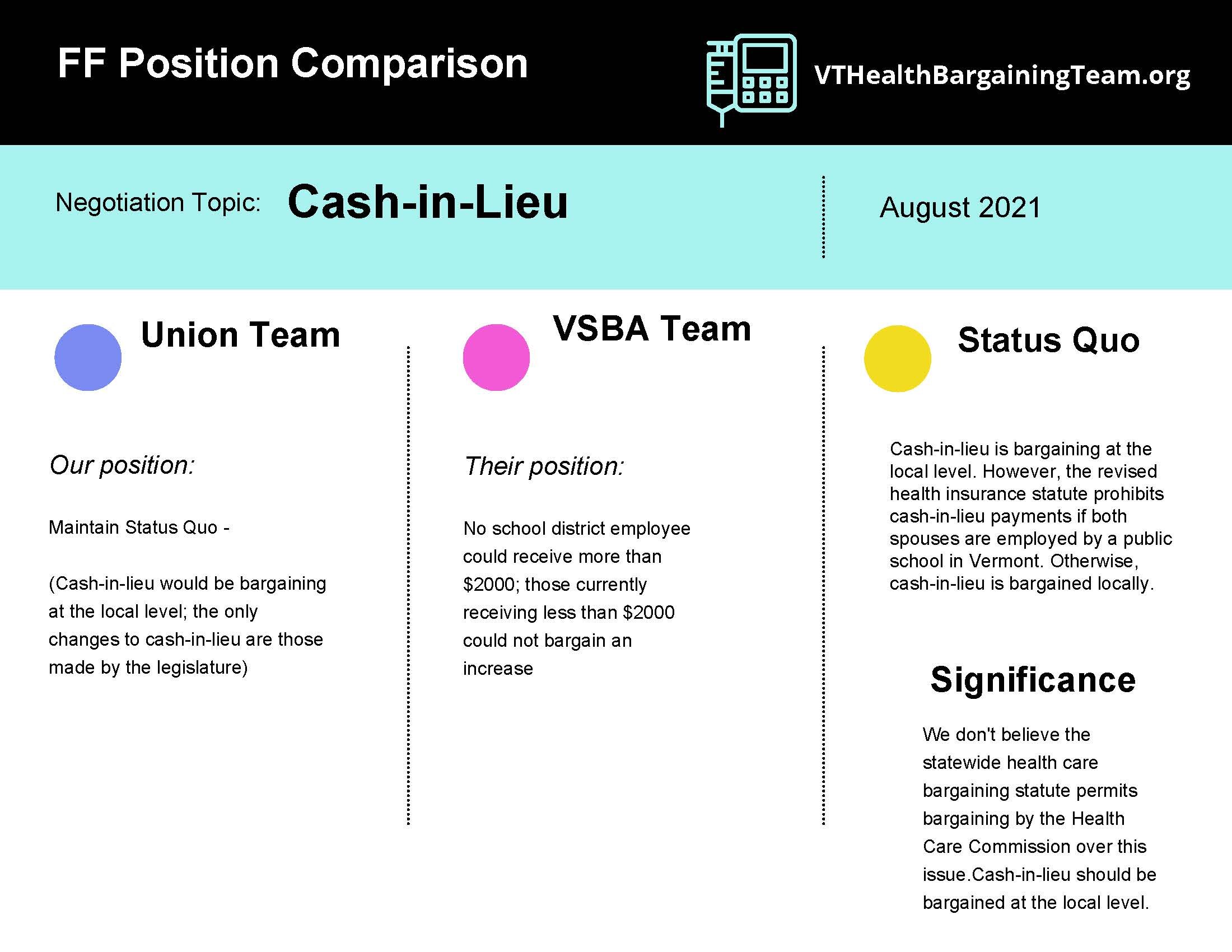
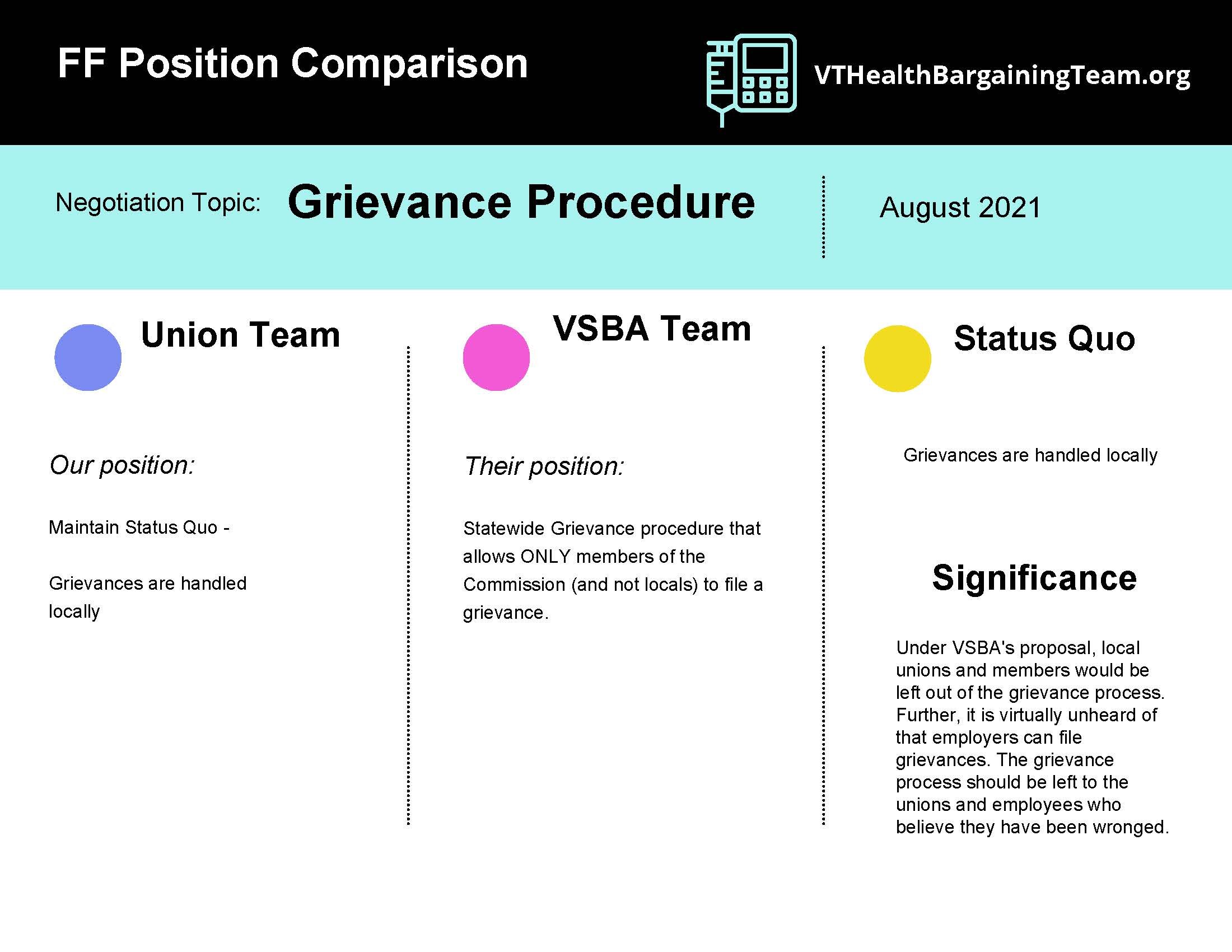
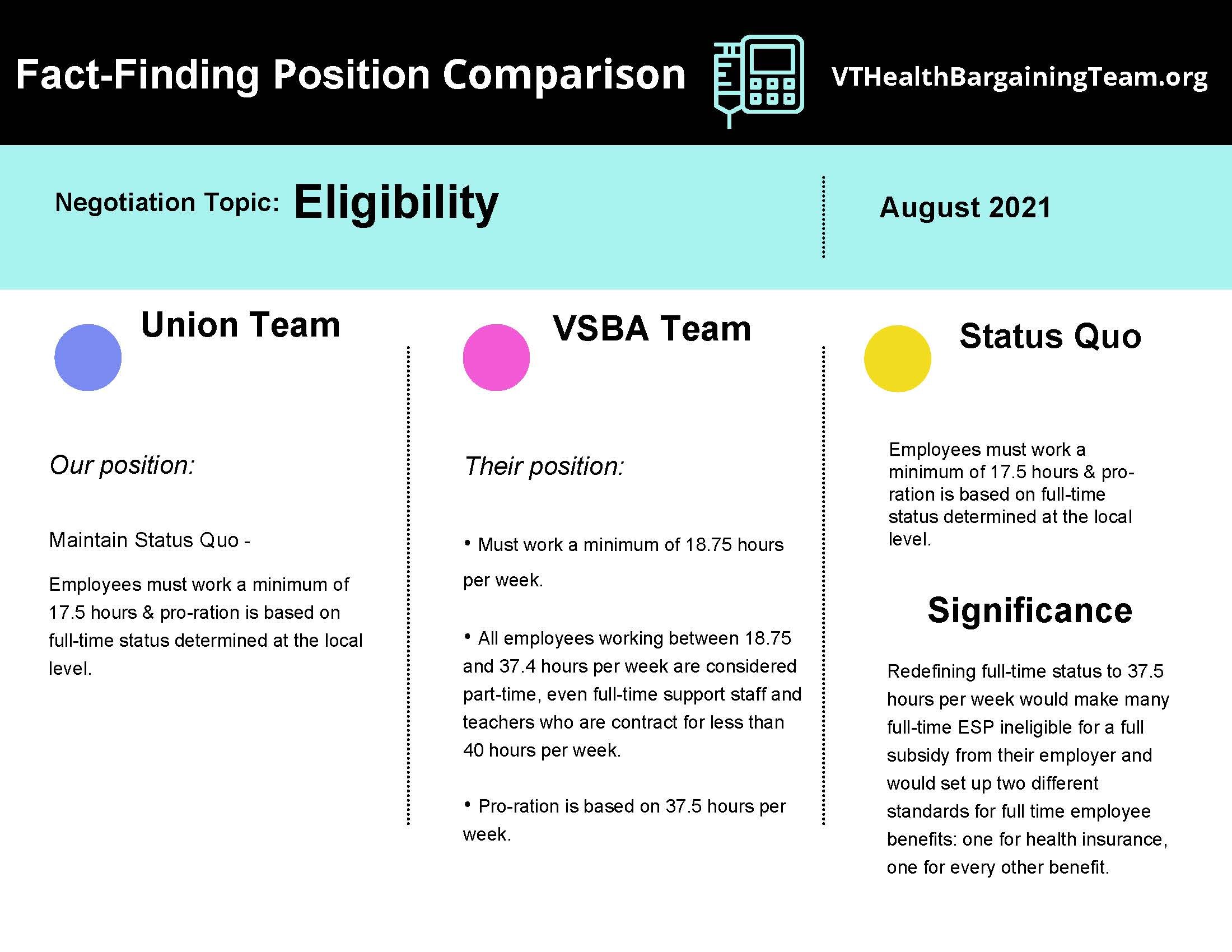
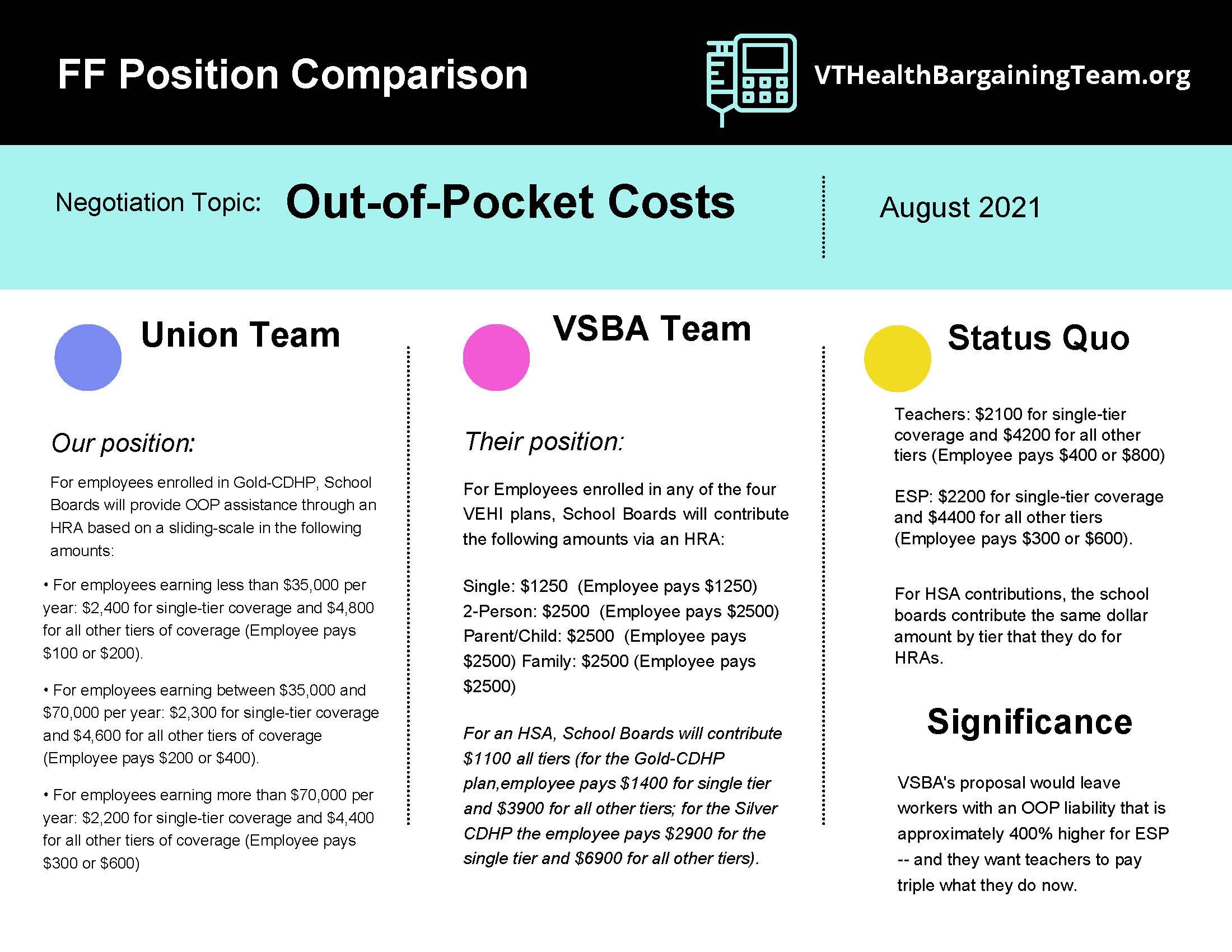
VSBA Team Insists You Don’t Deserve Accessible, Affordable Healthcare
August 16, 2021
At a time when Vermont is awash in nearly $10 billion of federal aid and facing an unprecedented period of growing revenues, the Vermont School Boards Association healthcare bargaining team wants to make it harder for educators – especially the lowest-paid school employees – to have access to affordable health insurance. Sadly, this group of five – which includes two private citizens who don’t represent any school boards – is continuing its assault on the thousands of dedicated school employees who have worked tirelessly on behalf of students during a global pandemic.
That is the unmistakable conclusion arising out of three days of testimony during a fact-finding hearing that ended late Thursday. “It is beyond understanding that the school boards’ team wants to punish the people who have gone above and beyond during a pandemic with more expensive and less accessible healthcare,” said Maple Run EA’s Mike Campbell, the chief negotiator for your healthcare bargaining team. “It’s also short-sighted: we know that at a time when virtually every district is facing shortages of ESP and teachers, slashing benefits is not the way to recruit and retain school employees.” That shortage is real: as of Friday, nearly 1,100 positions in districts across the state remain unfilled.
Several of the VSBA’s own witnesses admitted that reducing benefits is not an effective way of attracting and retain school employees, particularly the lowest-paid educators. Sadly, one of their own witnesses, Caledonia Central Supervisory Union School Board Chair Patrick Healy, seemed almost proud of the fact that vacancies in his district were primarily paraeducators, implying that affordable and accessible healthcare for educators is somehow anti-student.
The VSBA seems driven to make access to healthcare harder and more expensive for educators – especially our lowest-paid support professionals. Their team’s latest proposal bears that out:
Licensed educators would see their health care premium share jump from 20 percent to 22 percent at the end of a three-year package; our lowest-paid support staff would see their premium share jump to a minimum of 15 percent and then 2 percent a year up to 20 percent.
By contrast, your team proposes that licensed educators see premiums at 17 percent the first year, 18 percent the second year, and 19 percent the third year. For ESP, your team wants to avoid any increased premium share.
Licensed educators would see their out-of-pocket expenses increase dramatically from the current $400 per year for single coverage and $800 a year for all other tiers to $1,250 for single coverage and $2,500 for all other tiers. That’s a tripling of costs. For our support staff colleagues, the boards recommend the same out of pocket costs, for a quadrupling of what ESP pay now.
By contrast, your team proposes a sliding scale based on income. For educators earning less than $35,000 a year, out of pocket expenses for single coverage would be $100 and $200 for all other tiers; for those making between $35,000 and $70,000, the amounts would be $200 and $400; for those making more than $70,000, the amounts would be $300 and $600.
The board team also wants to make it harder for employees to qualify for access to full health insurance benefits by changing the definition of part- and full-time duty. Under the current agreement, employees working at least 17.5 hours have access to health insurance; full-time status is locally negotiated. The VSBA proposal would hike the minimum level to 18.5 hours and would mandate full-time at 37.5 hours, which would eviscerate locally bargained levels. This scheme would throw potentially thousands of lower-paid school employees off the health insurance rolls.
By contrast, your team wants to maintain the status quo, which continues to respect locally bargained definitions of full-time employment.
The VSBA also wants to strip the ability to file grievances related to healthcare at the local level; your team wants to maintain that right.
The VSBA also wants to halt the practice of allowing local boards and associations to negotiate so-called cash-in-lieu provisions. These provisions provide for cash payments to those school employees who are covered by a spouse’s or partner’s non-VEHI health plan. Your team believes that should remain a topic of local bargaining.
So what’s next? The fact-finder will pore over testimony and exhibits – including your team’s 12.5-pound briefing book – and render a decision by no later than September 15. After that, the two teams enter post-fact finding. If no agreement is reached, binding arbitration will take place, with a decision due by December 15.
For background and more detailed information, please click below. We’ll be in touch soon with more updates of how this process affects you, and how you can get involved.
Petition: Good Healthcare Makes Stronger Schools
July 7, 2021
Vermont-NEA President Don Tinney today officially delivered, via email, our healthcare petition signed by 2500 members and community supporters, to Neal Odell, the president of the VSBA Board of Directors, imploring him and the rest of the board to support our efforts at securing equitable, affordable, and accessible healthcare for our dedicated public school employees.
VSBA to Pandemic Heroes: Pay More for Less Healthcare
July 1, 2021
At the end of what was arguably the most challenging school year in our lifetimes, the team representing the Vermont School Boards Association in statewide healthcare talks wants to “reward” you by hiking premiums, upping out-of-pocket costs, and, even more cruelly, stripping full healthcare coverage for some of our lowest-paid school employees.
In an exchange of opening-round proposals (including a second proposal from your team), it is clear that the five VSBA representatives – only three of whom are actual school board members – want to weaken your healthcare benefits even as we emerge from a once-in-a-century pandemic that exposed just how important affordable, accessible, and quality healthcare is for everyone. In fact, their opening proposal would make it nearly impossible for education support professionals – our paras, bus drivers, cafeteria workers, custodians – to obtain full healthcare coverage after the current package expires at the end of 2022.
Clearly, the VSBA team has no regard for the human toll of making accessible healthcare even more out of reach for thousands of dedicated public school employees.
Or, as a member of the VSBA team put it during talks Tuesday, the only metric that matters to them is shifting more costs onto the backs of hard-working school employees, the same people local school boards across Vermont have hailed as heroes for keeping our schools open – and our students engaged – during the global pandemic.
Specifically, the VSBA team wants to:
Hike costs by having employees pay up to 24 percent of the monthly premium by the end of a three-year package.
Hike costs by increasing out-of-pocket exposure by thousands of dollars; their proposal would saddle our ESP colleagues with a quintupling of out-of-pocket costs and our teachers with a quadrupling of those costs.
Reduce access to healthcare by boosting the weekly hours required to qualify for full coverage, a move that will reduce healthcare access for thousands of our hardest-working and lowest-paid colleagues.
Unsurprisingly, your team categorically rejected the VSBA proposal. In contrast, your team wants to:
Improve access and affordability by tying premium contributions to an employee’s ability to pay. Specifically, employees earning less than $35,000 would pay 12 percent of the monthly premium; those earning between $35,000 and $70,000 would pay 15 percent; and those earning more than $70,000 would pay 17 percent.
Reduce out-of-pocket exposure by requiring school boards to fund a health reimbursement arrangement with employer-first dollars. These amounts, like premium contributions, would be based on income. What this means is that employees earning less than $35,000, would pay $100 a year in OOP costs for single coverage and $200 for all other tiers; for those earning between $35,000 and $70,000 the employee would pay $200 for single and $400 for all other tiers; for those earning more than $70,000, the amounts would be $300 and $600.
Maintain current eligibility levels for full healthcare coverage.
You can read the VSBA proposal here; you can read your team's opening proposal here; and you can read your team’s second proposal here. And you can compare the proposals in this side-by-side document here.
As you can imagine, your team – comprised of active teachers and support professionals – was disappointed and frankly insulted by the VSBA team’s opening proposal. Their proposal would have been wrong in a normal year; it is downright cruel in the tail end of a global pandemic.
So, what’s next? Both sides Tuesday declared impasse in negotiations, triggering the next steps in the healthcare bargaining process (a timeline is available here). Mediation is slated for July 7-9.
Your team is dedicated to ensuring that Vermont’s public school employees have continued access to affordable, accessible, and quality healthcare. We will carry that message – and fight for that goal – when we next meet with the VSBA.
As always, you can visit vthealthbargainingteam.org for more information. And to learn about the connection between our healthcare bargaining and our push for systemic healthcare reform, please watch a quick video by clicking below.
Bargaining for Second Statewide Healthcare Package Begins
It all begins with an idea.
May, 2021
Your healthcare bargaining team and the Vermont School Boards Association team are back at the table again to negotiate our second statewide healthcare agreement that will take effect on January 1, 2023. As you may recall, we were unable to reach a negotiated settlement with the VSBA team during the first round despite months of bargaining. The law governing the statewide healthcare bargaining process then left it to a neutral arbitrator to choose between proposals. The neutral arbitrator chose our package, deeming it fairer and more equitable. This was a win for us, but there is plenty for us to build on as we try and reach a negotiated settlement in this round of bargaining.
To that end, both sides last week held the first of three sessions with a facilitator. These meetings – two more are scheduled for May 6 and May 12 – are designed to help each side identify our priorities and mutual interests as well as clarify points of division, explore paths to a resolution and improve the overall negotiations process.
Our core principles include reaching an agreement on a healthcare plan that features:
Affordable access for all employees to high-quality, comprehensive healthcare, recognizing the cost and equity barriers faced by low-income school employees, most of whom are women.
Fairness in cost sharing between school districts and employees, both for premiums and out-of-pocket costs.
Simplicity of benefit administration for VEHI plans, Health Reimbursement Arrangements and Flexible Spending Accounts.
Effective and timely education about VEHI plan choices.
Sadly, the VSBA team’s position hasn’t fundamentally changed since our first round of negotiations. They believe that all school employees should pay more in monthly premiums and pay higher out-of-pocket costs.
To this end, we encourage you to add your name to our petition to the VSBA’s Board of Directors imploring them to work for a fair and equitable healthcare plan. At a time when the pandemic has demonstrated the vital importance of affordable and accessible healthcare, and the human costs of health inequities, the bargainers for the Vermont School Boards Association must be ready to work with us in good faith to reduce barriers to healthcare access for Vermont’s dedicated school employees. Please click here to add your name.
We also want you to be aware that next week we will begin conducting a household healthcare survey. This survey, conducted by a professional research firm, seeks to gather information that will be used by the bargaining team as they prepare to exchange economic proposals with the VSBA team. This survey will collect different data than that produced by our earlier, in-house healthcare survey.
Lastly, if the pandemic has taught us anything about healthcare, it is that we all need to fight for systemic reforms to ensure that healthcare is more affordable and accessible to all Vermonters. And that starts with achieving a fair and equitable package for school employees.
We will next update you after our May 12 meeting; in the meantime, keep up-to-date and learn more about healthcare bargaining by visiting www.vthealthbargainingteam.org.



